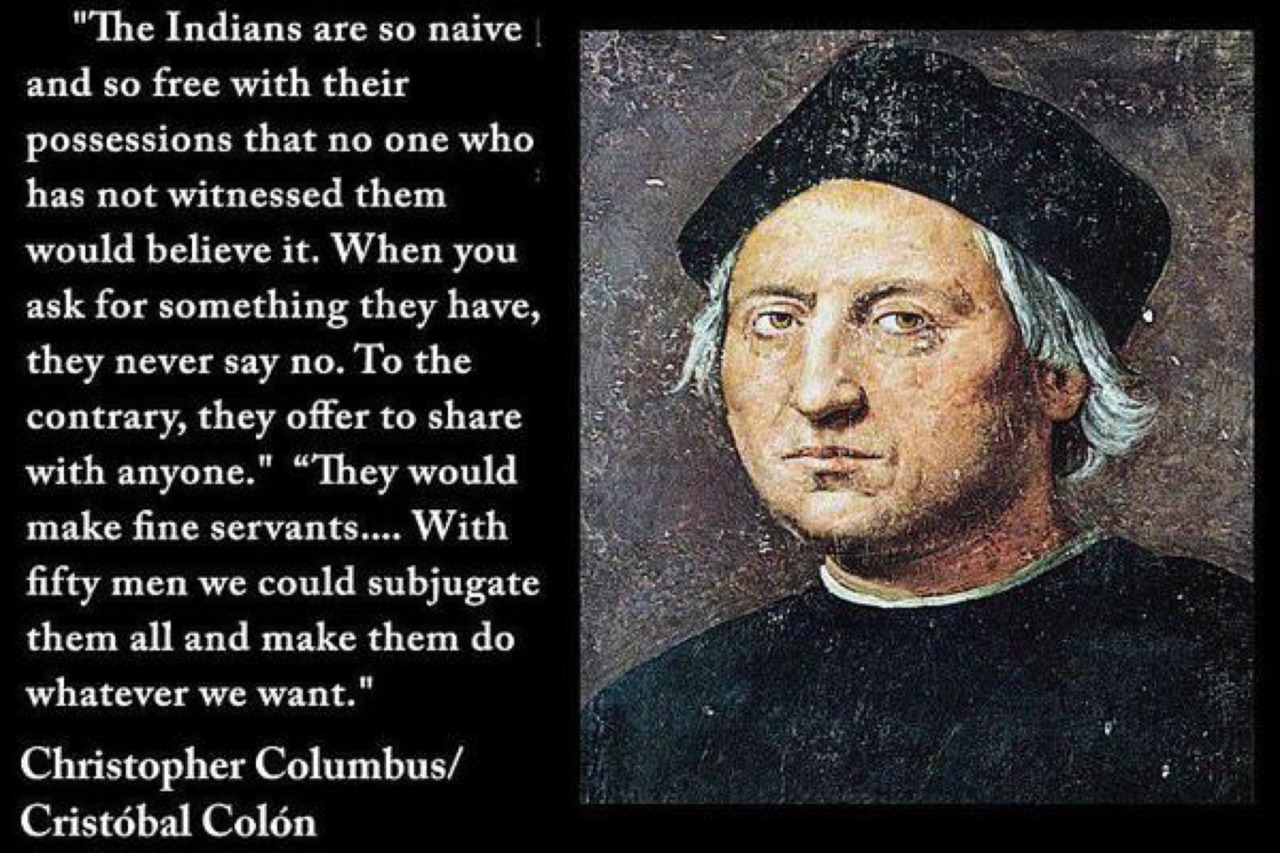As
with many things, Columbus Day has lost much of its meaning; many of us
associate it with sales at department stores and car dealerships; some of us
get the day off while some of us don't; and all of us regularly forget we won’t get any mail today. In
a way, though, that is precisely the problem with having a federal holiday like
Columbus Day—a holiday named after a man whose contribution to world history is
dubious at best, and murderous and racist at worst.
 |
| Columbus apparently had resting bitch face; probably the only thing we have in common. |
If you bring up the idea of getting
rid of Columbus Day, or changing it, as some states have done, to Indigenous People’s Day, the reactions vary. Columbus Day was originally signed into law
after the Knights of Columbus, a Catholic organization, lobbied FDR to make it
a national holiday in order to celebrate a Catholic hero. It has become a
de facto celebration of Italian-American heritage, and attacks on Columbus Day
are interpreted by some in the Italian-American community as attacks on that
particular heritage.
None of these facts and feelings can
change, however, the fact that Christopher Columbus, aka Cristobál Colón, aka
Cristoforo Colombo, neither “discovered America” nor “proved the world was round.” His contemporaries already knew the
world was round, and he certainly wasn’t the first person to “discover” the New
World. All of this is beside the fact that he never actually sailed or stepped
foot on the continental 48 states. If anything, he “discovered” and “colonized”
(the word itself comes from the Spanish version of Columbus’s name: Colón)
modern day Bahamas, Haiti and Dominican Republic.
Then there is the more damning
evidence against Columbus that suggests he might not be such a “hero” of
history. Like many (though not all) of his European contemporaries, he believed
the native peoples of the lands he colonized were there to be seized and owned
by the Spanish crown that he worked for (he himself was Genoese/Italian!). He
writes in his letters that “I have taken possession for their Highnesses, with
proclamation and the royal standard displayed” of the land, and that the people
there “are most wondrously timorous…I gave gratuitously a thousand useful
things that I carried, in order that they may conceive affection, and
furthermore may become Christians; for they are inclined to the love and
service of their Highnesses and of all the Castilian nation.”
.jpg) |
| Columbus's "achievements" have been celebrated by artists for centuries... These images perpetuate a narrative in which Columbus is a savior and a hero for Europeans. |
In later voyages, upon realizing that the
mines of silver and gold he hoped for were not to be found, Columbus took
native peoples from the Caribbean to Spain to sell as slaves. To his chagrin as
a businessman, King Ferdinand and Queen Isabella of Spain told him he could not
sell the natives as slaves. Columbus’s singular interest in the New World for
its money-making possibilities is, in a way, a precedent for later atrocities
and the dehumanization of the native peoples in the Americas. The letters of
Bartolomeo de las Casa from fifty years later discuss in great detail some of
the ways that the Spanish tortured native peoples for entertainment: burning
them alive, cutting off parts of their bodies, slicing babies in half with
swords or throwing them in the sea, etc.
 |
| No caption necessary. |
Aside from being one of the earliest
practitioners and proponents of a transatlantic slave trade, Columbus was also
just a nasty guy. As governor of the Island of Hispaniola, he was tyrannical
and dictatorial; eventually he was deposed as governor and even arrested by the
Spanish crown. There are stories of how he disfigured a man arrested for
stealing corn by cutting off his ears and eyes; earlier in his voyages, a personal friend reports that Columbus
bragged about whipping and raping a native woman who did not welcome his
sexual advances.
So, should we keep a federal holiday that celebrates Columbus, specifically? Probably not. Should we recognize the far-reaching effects of his
voyages on native peoples, on our culture now, and on millions of enslaved
Africans who were brought to the New World soon after its “discovery” (re-discovery?)
by Spanish and Portuguese conquistadors? Should we take a day to deepen our
understanding of the pernicious, long-lasting effects of colonization and its
racist and eugenicist assumptions? Should we work together to forge a future in
which these issues are remembered and learned from, instead of ignored,
forgotten, or even celebrated? I think the answer to all those questions is a
resounding “yes.”
No comments:
Post a Comment